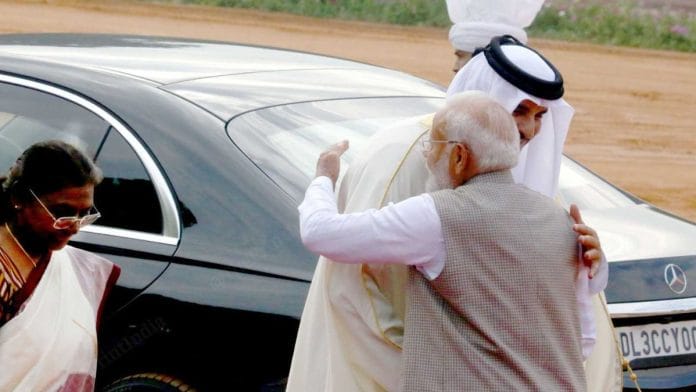New Delhi: India and Qatar elevated the relationship to a strategic partnership, with a potential free trade agreement, investments in India by the Qatari sovereign wealth fund, and doubling trade and energy security among the key outcomes of the two-day state visit of Qatar Amir Sheikh Tamim Bin Hamad Al-Thani to New Delhi.
“As far as Qatar is concerned, both sides are exploring the possibility of signing a free trade agreement in the future and that was one of the discussions, which took place in this round of talks,” said Arun Kumar Chatterjee, Secretary of Consular, Passport and Visa Division (CPV) and Overseas Indian Affairs (OIA).
Speaking at a special briefing Tuesday, Chatterjee added, “Both sides have today agreed to elevate the relationship to a strategic partnership, and India and Qatar have signed an agreement in this regard today. Trade, investment and energy were among the major topics of discussion between the two leaders.”
Prime Minister Narendra Modi broke with protocol Monday and received the Amir personally at the Indira Gandhi International Airport in New Delhi. This was his second state visit to India since 2015. It follows Modi’s visit to the West Asian nation last February.
India is also in talks with the Gulf Cooperation Council (GCC)—the regional bloc that includes Bahrain, Kuwait, Oman, Qatar, Saudi Arabia and the United Arab Emirates (UAE)—for a free trade agreement. The agreement was also discussed between the two leaders, apart from the agreement to explore a potential bilateral trade deal.
The visit comes as the two countries build on the positive momentum in ties following the challenges after the arrest of 8 Indian Navy veterans in August 2022 on charges of espionage.
The veterans, which included seven officers and one sailor, were initially sentenced to death on 26 October 2023. They were pardoned by the amir last February, and seven have since returned to India. One officer remains in Qatar due to issues surrounding a different legal matter. Days after the pardon, Modi visited Qatar for a two-day official visit.
For Qatar, India is one of their largest trading partners, and, during the amir’s visit, the two countries agreed to double trade from its present levels of around $14.08 billion to around $28 billion by 2030.
India and Qatar maintain long-standing economic linkages. Until 1966, Qatar used the Indian Rupee (INR) as its national currency. That year, Qatar and Dubai, following the devaluation of the Indian currency, signed an agreement to introduce their own currency, the Qatar-Dubai Riyal (QDR). Seven years later, in 1973, when Dubai joined the UAE, Doha introduced its own currency, the Qatari Riyal (QR).
Doha is an important energy partner for India, and in the 2023-2024 financial year, it accounted for roughly 46 percent and 26 percent of imports of liquified natural gas (LNG) and liquified petroleum gas, respectively. The West Asian country is key to India’s ambition of increasing natural gas consumption as a part of its energy mix to 15 percent by 2030.
Last year, QatarGas and Petronet LNG signed an agreement to supply LNG to India until 2048, worth roughly $78 billion. The agreement succeeds the long-term agreement signed by the two companies in 1999.
During this visit, India and Qatar also signed two agreements, including the strategic partnership and the double tax avoidance agreement (DTAA), and five memorandums of understanding (MoUs) across different sectors. The MoUs cover cooperation in archives and documentation, youth affairs and sports, promoting mutual investments, and cooperation between bilateral business forums.
Also Read: Dhaka brings up renewal of Ganges Water Treaty during Jaishankar-Hossain meet in Muscat
Strategic partnership, investments & security ties
With the elevation of ties to a strategic partnership, the two countries will expand relations to include security cooperation and potentially the defence sector. The security component of the strategic partnership could lead to potential security-related dialogue between the two countries.
The strategic partnership with Qatar is the fifth such agreement India has signed with a GCC nation. New Delhi has previously signed strategic partnerships with Saudi Arabia, Oman, Kuwait and the UAE.
The amir’s delegation included members from the Qatar Investment Authority (QIA), the $500 billion sovereign wealth fund of the West Asian nation. The QIA is looking to make a substantial investment in different projects in India, including sectors such as infrastructure, ports, shipbuilding, energy including renewable energy, smart cities, food parks, start-ups, and critical and emerging technologies.
Currently, the QIA has a little over $2 billion in investments in India, including a billion dollars in Reliance Retail, $450 million in Adani Transmission Ltd and $393 million in IndoSpace Logistics Parks IV.
For India, Qatar has become an important partner in West Asia, highlighted by the fact that External Affairs Minister S. Jaishankar has visited the country twice since last June and met with their senior leadership on the margins of the India-GCC foreign ministers’ meeting held in Riyadh in September 2024.
(Edited by Sanya Mathur)






